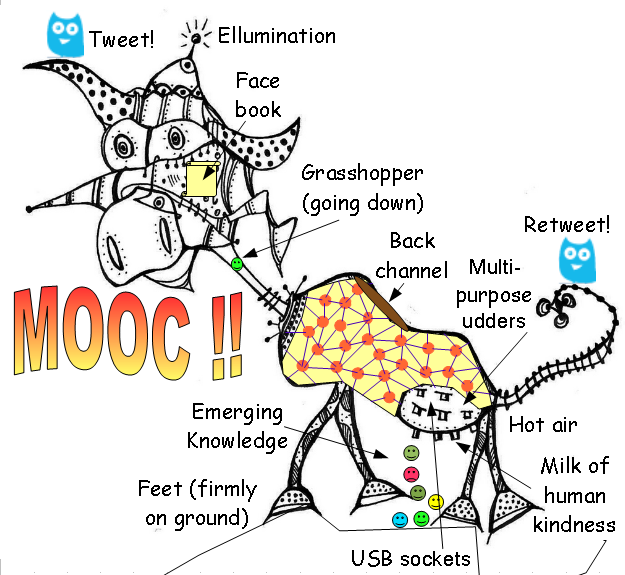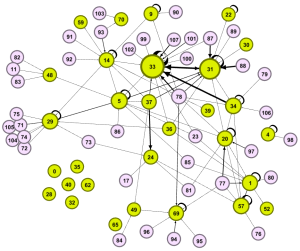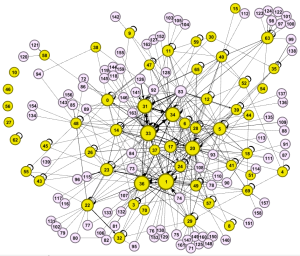People, the Planet and Climate Change
So much has happened in the year since I last blogged about education and Climate Change Denial. The Covid19 lockdowns were a good opportunity to grapple with Climate Change issues and led to an abrupt change in my thinking.
I had intended to read more of the science in an attempt to at least master the basics and I enrolled in a couple of MOOCs. Apart from never having had the time to really study (I have a big garden!), I came to realise that the major problems surrounding climate change are not with the science at all, at least not with the basic science , which is quite clear and accepted.
The main problem with the planet is people. On the one hand, people with power who may or may or may not see the looming emergency but are hamstrung by short-term issues like the next election or the profitability and growth of large companies. But also, so many other people have yet to wake up to the massive lifestyle changes that the changing climate is likely to impose on all of us, sooner or later and in one way or another. Even if all the promises made at COP26 are kept, we’re still heading for more than 1.5 degree global warming by the end of the century and can we really believe that all the promises will be kept?
At about 1.2 degrees warmer now we are already experiencing alarming changes in weather patterns. More extreme weather disasters, devastating heat waves, forest fires and rising sea levels are forecast and millions of people may lose their homes. Of course nobody knows exactly where or when and to what extent disruption will occur but if societal collapse or even human extinction is a real possibility shouldn’t every one of us be very concerned? I don’t believe that a bleak future for humanity is inevitable. Sustainable living for the world’s populations is not impossible as indigenous communities have demonstrated for thousands of years but in Einstein’s words, “Problems cannot be solved by the level of awareness that created them.“
Since it’s too late for incremental change, surely the Climate Emergency calls for a paradigm shift, a radical switch in our thinking before drastic lifestyle changes are forced upon us whether we like it or not! As an example, consider the replacement of fossil fuel driven cars with electric ones. This is often seen as an obvious, incremental climate change ‘solution’ but it only tackles the source of power. In the long term, having fewer cars makes much more sense so that travel is reduced to encourage greater use of public transport, walking, cycling and improved Internet facilities while working from home. This is certainly not ‘business as usual’ but neither is it unrealistic. The mayor of Paris, Anne Hidalgo is encouraging self-sufficient communities with her 15-minute city policy, so that everyone’s needs can normally be met within a 15-minute walk. The ‘quarter-hour city’ offers residents everything on or near their doorsteps, improving their quality of life, creating a vibrant collection of neighbourhoods while reducing pollution and stress. There’s also research suggesting that city allotments could become as productive as conventional farms.
I’m no student of belief systems whether philosophical, religious or political but in every single one, isn’t there a bottom line, an aspiration for the greater good? Of course differences emerge when it comes to ways and means but since it can’t be ‘business as usual’, should we not dig down deeply enough to find common ground? – there may not be much time left!
on climate change and our relationship
to one another and to the Earth.
The climate emergency is the most serious problem humanity has ever faced. We are only a small part of nature connected with so many other living things and yet we know that our actions are threatening the whole complex planetary ecosystem. Why can’t we wake up to the harm our species is inflicting on the Earth, including ourselves? Doing little or nothing is consenting to the continued destruction of the planet! Somehow, while respecting our own values and beliefs and those of others, we have to unite in hope, prayer, consciousness raising, spirituality, whatever it takes, to raise awareness. The choice is up to every one of us, whether to fear a new path or to embrace it.
Climate Change Education – Denial ain’t just a River in Egypt!
“It is an astonishing fact about the current era that in the most powerful country in world history, with a high level of education and privilege, one of the two political parties virtually denies the well-established facts about anthropogenic climate change.” – Noam Chomsky
Formal education systems must take some of the blame of course and not only in the USA. Whatever the time scale, climate change is likely to necessitate drastic changes to human lifestyles for very survival. Some changes will undoubtedly be painful and impossible to achieve without civil unrest unless they are willingly accepted by entire populations and as a challenge rather than an unwelcome imposition by lawmakers. It’s cheaper to educate than imprison! Education has a big part to play in creating the necessary climate of opinion but whether formal or informal, the task of influencing so many people, at all stages in their lives and shades of political opinion, is not straightforward and will require different approaches at different levels of education.
- Formal Education – Children and young adults will bear the brunt of the forthcoming climate crisis for obvious reasons. Every child should leave school with factually-correct and realistic ideas about climate change. Teachers have the difficult task of matching content and presentation to different age groups and this should include countryside trips and nature appreciation at all levels. Virtual Reality (VR) may prove to be useful, particularly in the face of limited resources for travel outside the classroom. Here’s an example:
Open Education Resources (see OER below) are now widely available to teachers including Massive Open Online Courses (MOOCs). Some may be perfectly suitable for interested teenagers. - Informal Education – It is easy to castigate people who either unthinkingly repudiate climate change, are confused or are simply too involved with their daily lives to bother much about it. Gentle persuasion is more likely to change their minds than confrontation. Ridicule, can actually reinforce denial. So discuss patiently, find common ground, employ humour, give clear examples of climate change in action – befriend. The carrot is preferable to the stick! You do not have to be an expert. Start by chatting about something straightforward and non-controversial, eg the difference between climate and day-to-day weather and then lead on seamlessly to more complex ideas. Never ‘talk down’ or be condescending. Openly acknowledge the limitations of your own knowledge and learn from theirs.
A recent study suggested that personal stories can be a persuasive communication strategy. Sharing anecdotes about how the climate crisis is changing lives can persuade people to care.
- Open Education – The advent of MOOCs (Massive Open Online Courses) in 2008 opened the door to free education for anyone with Internet access. The original ‘connectivist’ MOOCs have given way to commercial exploitation but it is still possible to freely audit and download substantial amounts of content provided assessment and certification is not required. MOOCs are often given by universities in partnership with suppliers such as Futurelearn, Coursera or edX. They are ideal for self-directed learners who can find and benefit from suitable courses by themselves and there is usually opportunity to meet and learn from other like-minded participants in online forums. An edX course given by SDG Academy, “Climate Change: The Science and Global Impact” is a good example of a relevant course.
In general, Open Education Resources (OER) offer many opportunities for anyone, anywhere to educate themselves about Climate Change for little or no cost apart from Internet access. Open Textbooks and other OER are now widely available for free access – eg see the links provided by The Library and Learning Commons at Washtenaw Community College.

Sometimes the stick! (Wikimedia Commons)
- Brute Force Education – Although hard core climate change deniers are unlikely to change their ways any time soon, the stick rather than the carrot can be appropriate in this case. No violence please but forcefully tackling out-and-out deniers in no-holds-barred argument and well-aimed ridicule, is not just good spectator sport but can also attract and benefit undecided onlookers. The views of this type of denier may not be altered one jot but aggressive deniers can influence others with misinformation and should be confronted. Gerald Kutney on Twitter ( @GeraldKutney ) is very active in this role. He points out that, “Propaganda repeated again and again becomes the “truth” if not challenged, and silence is the enabler of propaganda.”
As with all conspiracy theorists, the most difficult to tackle are ‘experts’ who can spend hours cherry-picking and manipulating reasonable facts to prop up their own fallacious arguments. Best to keep well away unless you have the necessary expertise and stamina to indulge! Some of the worst are religious fanatics. ‘God intended it as a disposable planet’ is a truly shocking example.
The importance of climate change education is barely recognised alongside its big brother, climate change itself. The pandemic has shown that vast resources can suddenly be found when the powers that be confront a widely accepted emergency situation. The climate emergency already faces an uphill struggle for general acceptance. Educating populations towards accepting the challenge is vitally important.
Climate Change – Pessimism or Optimism?
As I continue to study Climate Change science I lurch between pessimism and optimism in regard to current efforts to mitigate global warming. COP25 was not much of a boost for optimism:
What of the future and the outcome of the UN Climate Change Conference (COP26) in Glasgow this November? Well, it’s said that prediction is difficult, particularly about the future! Let’s see.
Extreme Pessimism
Thousands of angry activists, including bands of school children, converge on Glasgow for COP26 but yet another failure threatens. The claims of poorer countries, already suffering and most likely to suffer in the future from rising sea levels, hurricanes, fires and all the other manifestations of climate change are virtually ignored by the major polluters. The activists try to stop conference delegates leaving without reaching agreement but are beaten back by a massive police presence. A full scale riot ensues with many arrests. Several activists, including children, are seriously injured by police baton charges as the police battle to clear a way out.
Rich countries and states, now in a fit of ‘me-first’, isolationist frenzy now erect protective barriers, real and economic, in a doomed attempt to maintain their own economies at previous levels while poorer countries fight among themselves for vanishing resources. Mr Trump, in his second term of office, pays lip service to shrill warnings from his own advisers and plants a couple of trees but courts short-term popularity by diverting massive resources into areas of the US most affected by increasingly frequent disasters. The intensifying trade war between the US and China leads to shortages of vital imported goods in both countries. Mr Trump threatens nuclear retaliation when China annexes a neighbouring country possessing scarce resources …..
Extreme Optimism
Thousands of hopeful activists, including bands of school children, converge on Glasgow for COP26 in the wake of Mr Trump’s presidential election defeat. The new US president immediately halts previous attempts to withdraw from the Paris agreement and aligns herself with the more proactive voices in the conference. But negotiations are complicated and protracted arguments drag on through the night. Huge crowds of activists worried by a lack of progress gather outside determined to stop delegates leaving with no agreement.
Finally, the police raise their batons preparing to clear the way when a small child pushes her way out and stands alone, directly in front of the police lines. A moment later she’s joined by an older boy, then another child and yet another until a wide band of children form a human shield in front of the main crowd of adult activists. In the silence that follows one policeman suddenly lowers his baton. The small girl approaches him and hesitatingly attaches a green leaf onto his tunic – the policeman smiles.

The children begin to sing. Many in the police lines shuffle uncomfortably but lower their batons before orders are given. At once the situation defuses. The incident becomes viral on social media and is relayed to all corners of the globe …… and crucially, to those inside the conference. Somehow, minds are concentrated and within 24 hours an acceptable agreement is reached. The activists draw back and applaud the exhausted delegates as they file out. All countries are now agreed on new long term goals cutting their carbon emissions in line with the latest science. Very specific but fair rules are accepted for a carbon market between countries. What follows is some form of the “Green New Deal” encompassing drastic policy changes and leading to ecological transformation driven by mutually supportive communication and connection between the planet’s diverse communities .
Meanwhile, back in the real world, Mr Trump has classed climate activists as alarmists who demand, “absolute power to dominate, transform and control every aspect of our lives.”! This arrant nonsense would be laughable were he not president of a major polluting country. How can such people be educated? I favour the carrot rather than the stick but if all else fails I wonder whether minds would be concentrated by an International Court dealing with those in positions of power shown to have wilfully exacerbated global warming with full knowledge of the consequences?
Climates of Opinion
Although I’m a member of the Green Party I’ve done little to educate myself on environmental matters. Now, spurred on by the recent protests, I’ve enrolled in a FutureLearn MOOC: Climate Change: The Science (University of Exeter). Apart from the persistent exhortations to ‘upgrade’ for £42, I like the flavour of this MOOC. It is basic and that’s what’s needed when a fair number of participants don’t have a scientific background. I may chortle when a poet expresses surprise that water can actually exist as a gas but then I’ve been baffled trying to interpret poems in a literary MOOC. There’s even a climate change sceptic (denier?) informed enough to bait and draw out ‘expert’ participants. Although I have a scientific background my knowledge on climate change is deficient so I’m happy to learn from anyone.
In general, I believe Open Education can play an important role in preparing human populations for the drastic lifestyle changes necessitated by climate change. The evidence is as solid as science can make it but unfortunately is not accepted by everyone, including important political powers in major polluting countries. In the US, Alexandria Ocasio-Cortez (AOC), an American politician has proposed the Green New Deal, a stimulus package that aims to address climate change and economic inequality. She narrates a video I found featured by Bryan Alexander on his blog. In Bryan’s words;
It sketches out a scenario of what the world could look like if certain things come to pass – in this case, if some form of the Green New Deal came into being. It combines both large-scale trends (policy changes, ecological transformation) and personal details (our heroine’s career). The details give us enough grounding to imagine not only this possible future, but ourselves within it.
.
Whether you think the chain of events portrayed is realistic or not, it is an impressive narrative, rightly lauded by Bryan Alexander and the comments on his blog but go to the video on YouTube for a different story. Here the ding-dong battles between the believers, the doubters and the out and out deniers is in full swing and frequently descends into rant and ridicule. Sadly, retaliation in kind by those capable of informed discussion is not unusual and contributes to a downward spiral of debate and a polarisation of opinion. Recent election events, not to mention the junk that arrives in my spam folder, shows that social media and the Internet in general, is now widely recognised as a powerful tool for opinion forming. Vast resources are available for influencing attitudes, often for questionable purposes, by posing impossibly simple solutions to complex problems.
But climate change is not questionable. In many ways it is a complex problem but the basics are not and raising awareness is surely just as amenable to the arts of persuasion as anything else. I’d be happy to see my spam folder full of digestible, factual, persuasive info on climate change. I’d love to see an army of informed commenters taking on the YouTube deniers, not by feeding the trolls but accurately and diplomatically challenging misapprehensions and having the strength of character to simply move on without retaliating in the face of hostility. Perhaps it’s too much to deploy benevolent swarms of artificially intelligent Twitter bots to fight fire with fire – but you get the idea! If not checked climate change threatens the very existence of life on earth. Would the end justify the means? A fundraising campaign brought in pledges of over €1 billion to restore Notre-Dame Cathedral. Could massive resources not be found to combat climates of opinion as well as climate change itself?
The Best Laid Schemes …..
Alas, most of the plans detailed in my last post have been on hold. My wife unexpectedly suffered a cardiac arrest last July. (I’ve commented on Jenny’s blog about the superlative care she received at Dumfries hospital, courtesy of our wonderful National Health Service.) Now, after a considerable period of adjustment, I’m rather sadly looking at the various projects I mentioned before.
Virtual Reality – This is about the only project I’ve had any time for. Having acquired a suitably powerful computer with the intention of coupling it with an Oculus Rift headset, I then discovered the Oculus Go. This is a less powerful and less expensive headset but it’s a standalone device so no connection to a desktop is needed and at least in principle, you can wander around with it on anywhere, preferably in WiFi range – but keep the area clear of real obstacles! There are plenty of reviews and on the whole it gets a good press, particularly for gaming but VR has many other applications (eg see this review ) and for educational use the potential is enormous.
Oculus Go Headset (Wikipedia) Oculus Go Controller (Wikipedia)
I’ve only had the Oculus Go for a short time so I’m no expert on its use but probably a good guinea pig as my eyesight and hearing is not first class and audio or video imperfections become more apparent. Never having experienced VR before my first impression was very encouraging. There’s a huge difference between VR compared with ‘normal’ screen experiences – ie TV, cinema or even 3D cinema. VR immersion really does give a realistic impression of being right in there, surrounded on all sides, above and below and with the ability to change your view view in a natural way by turning your head in any direction. Sometimes the illusion was so persuasive I became confused about where I ‘really’ was. Not that I’ve had more general feelings of disorientation or sickness except perhaps slightly on the iconic rollercoaster rides. Evidently disorientation can be a problem for some and may be of particular concern for children.
VR can be more engaging than video or textbooks in many learning situations. Applications are not too hard to find or imagine. There are extensions of existing non-VR applications such as safe simulation of chemistry or physics experiments, learning how to fly an aeroplane or defuse a bomb and so on but also some quite new ideas. An ‘empathy machine’, for example, where the viewer embodies another person of a different race or gender – or disability, age, refugee status etc. with a view to encouraging better understanding and positive attitudes. At present, the potential of VR for education is mostly just that because the technology is new. It may be impressive in comparison with existing media but the performance gap between ‘real life’ and VR remains significant, particularly with the cheaper headsets such as the Oculus Go. Headsets are cumbersome to wear, image resolution can be inadequate and odd effects can spoil the illusion.
AltspaceVR 101 – digital society of AltspaceVR (via YouTube)
Also, with person-to-person communication, there’s a world of difference between meeting someone in real life and meeting as an avatar that can speak and move around but can only wriggle its head and wave its arms. At least that was my experience with the social platform AltspaceVR and it was certainly inferior to a video chat, via Skype for example, where facial expressions and true arm movements can contribute to the richness of conversation. It was also disconcerting when other avatars materialised right in front of me or even on me!
Writing – To my surprise my 3 SF short stories have been published as a book entitled ‘The Great Malvern Paradox’ – available from Amazon in paperback, Kindle or audiobook forms. I don’t think they’re selling like hot cakes but I am encouraged to write some more.
Consolidation is the Name of the Game
Having been around for more than three quarters of a century I’m trying to consolidate and integrate some of my interests before I forget what they are! The time has come to draw together the ragged ends of various projects and half-baked activities with a view to planning for the future. What follows is essentially a note to myself, a brief personal account of what I’ve done, or not done – and a quick look ahead.
The PastI lectured for about 30 years in a UK University on electonics and communication topics. I was pretty single-minded about my work there so when I retired in 2001 I decided to diversify. I’d already started iBerry, a Higher Education website in 1999 and when my wife and I moved to Malvern in Worcestershire in 2002, kids having flown, I added several other interests. I helped with a charity, I tried to understand quantum computing, (still don’t), and we gardened (still do). I played with the open source Linux operating system. I experimented with a Raspberry Pi computer and camera with a view to detecting and videoing marauding foxes (never did!) I also took an interest in the fascinating history of the Water Cure as it panned out here in Victorian Malvern. Apart from collecting info, taking local photos and writing a related short SF story that few read, the history project has yet to take off. I wrote a couple of other SF stories (see top right menu) and a publisher has actually expressed interest – we’ll see! I’ve also collected considerable info on my doggedly Scottish ancestors – another project awaiting completion. Oh – I sort of learned to cook, proudly graduating from a real life course entitled, ‘Man in Kitchen’! |
|
| Education and iBerry has always been one of my main interests and in 2010, as an experiment using xtranormal, I made an animated video, ‘A Cautionary Tale‘, a fantasy involving Open Education. I thought it wasn’t too bad but I never tackled another. A year later I was lucky enough to join one of the first MOOCs, CCK11, (‘Connectivism and Connective Knowledge’, facilitators Stephen Downes and George Siemens ). | |
|
The original connectivist MOOCs encouraged learners to contribute on their on blogs and being somewhat dubious and befuddled about connectivism as a learning theory, I created a fanciful ‘MOOCow‘. |
|
| The reaction was astonishing. 42 comments and now over 2,000 views including plaudits from Jim Groom, George Siemens and other big names. MOOCow popped up in keynotes and presentations of all sorts, all over the globe, with or without attribution. I pontificated in this blog on various education issues during CCK11 and made contributions during other later xMOOCs but MOOCow is my main claim to fame! On the whole, MOOCs are excellent resources for learning and I have no qualms about Milking a MOOC for whatever takes my interest. Current monetised xMOOCs have moved some way from the free and open connectivist model but there’s usually a wealth of good open educational content for self-directed learners to view and download to suit themselves. I’m the proud possessor of a couple of MOOC certificates, collected when they were free but there’s no obligation to pay. |  MOOCow -Based on ‘la vaca de los sinvaca’ by José Bogado Creative Commons Licence [This work is licensed under a Creative Commons Attribution-NonCommercial 3.0 Unported License.] |
| In fact only a small proportion of learners bother about assessment and buy certificates. Multiple choice questions, essay review by peers and so on can be interesting and helpful for learning but their value as assessment tools is limited.
More recently, I became an approved mentor, twice on FutureLearn’s online course, ‘Learning in the Network Age‘ – a whole new experience! Unlike the really massive MOOCs, there were only a few hundred active participants on each course and an abundance of fellow mentors. I’m no education expert but the course was introductory and I assisted learners on the basis of my personal experience of MOOCs and the web. I enjoy coding, (I’m a Fortran veteran) and I began to learn Python in 2011. As an exercise I developed a ‘Comment Collector‘ (first version called a ‘Comment Scraper’) with the purpose of bringing together abbreviated versions of MOOC blog posts with their comments on one page – here’s an example. I thought others might find this useful so I used it in a series of MOOCs and also for the renowned RHIZO14 and RHIZO15 online courses that were facilitated by Dave Cormier. Participants on these courses considered the Comment Collector interesting and useful but it did compete with several other blog aggregation tools and there’s not been much interest since. Politically, I’m lazy but as a young man I did participate in the famous Grosvenor square demonstration in London in 1968 (I refused to throw stones!) and more recently with my wife in Edinburgh against the Iraq invasion in 2003. I also joined the Green Party but, regrettably, don’t do anything. The FutureVirtual Reality – This is a completely new project. I’ve only recently acquired a suitable computer and now I’m considering what headset to get. The technology is not nearly mature but the impact VR will have on education and other fields is likely to be enormous. iBerry, Connecting the World’s Learners – a simplified iBerry focuses on self-directed learning and learners rather than just anyone with an interest in Higher Education. But how does anyone become a self-directed learner with the self-confidence and motivation to take charge of one’s own learning? Connection with other like-minded learners is one obvious answer but exactly how this can be encouraged and achieved is another question! Our Drupal content management system is being abandoned in favour of a relatively straightforward HTML format. This does not have all the Drupal bells and whistles, taxonomies, news aggregator etc but it’s still quite easily managed. The iBerry blog is integrating with this one – spelling will be English English! Malvern Water Cure – I’m anxious to get this project going again. More photos to be taken over the summer and info organised as time allows. Linux and Raspberry Pie – I want to explore the possibilities of an open operating system and a tiny computer. I’ve already installed Linux on an old laptop and I’ll try to make time for further investigation. Writing – I’d like to try writing more light SF. Unfortunately, I find much of current SF either incomprehensible or so good it puts me off writing my own! Perhaps I’ll try again later this year. Comment Collector – Unless there’s further interest I will probably abandon this project Politics – My wife and I are planning to attend the London anti-Trump demo in July this year – we feel like throwing stones …. |
|
What are learning theories for?
| I taught in a university for many years but only came across learning theories in 2011 in one of the first MOOCs – CCK11 on Connectivism. Coming from a science background, the term ‘theory’ in ‘learning theory’ was a source of confusion. Learning theories are conceptual frameworks proposed and developed by highly respected researchers but they do not enjoy the status of established theories in the physical sciences. They are more like hypotheses, proposed explanations on the basis of evidence that’s probably incomplete, disputed or even pure speculation. For a start, how can a learning theory ever be complete without detailed reference to the place where learning occurs – the brain? Learning theories are important as a source of ideas but difficulties with the collection and interpretation of evidence make firm conclusions hard to come by. | |
| Learning theories may be in their infancy as science but can play a valuable role in providing alternative frameworks for educators, motivating examination of teaching practices and perhaps making improvements on a more rational basis. Even basic familiarity with Behaviourism, Constructivism, Connectivism etc may help educators spot elements of these theories in their own teaching and encourage experimentation. For example, a teacher of medical subjects insisting that a multitude of specialist terms be memorised, might usefully evaluate behaviourist elements in their teaching. (I recall a medical student passing every ‘spotter’ test by studying all through the night before the test with a bottle of whisky: ….. “The thigh bone’s connected to the hip bone …” – Operant conditioning?). |
The Skeleton Dance – song for learning parts of the body. (Super Simple Learning) |
| Teaching in real classrooms or lecture rooms embraces many different circumstances but learning theories say little about what’s actually being taught. There’s a world of difference between STEM type material where ‘facts’ and ‘correctness’ play a far more dominant role than in the humanities with considerably more scope for debate and discussion.
An obsession with the instructivist trappings of Behaviourism has its dangers but caveats apply to any learning theory. Consider the distressed child who just can’t ‘get’ negative numbers while his obsessively constructivist teacher keeps insisting that he had to be self-directed and figure it out for himself. Connectivism, focusing on connected learning and personal learning networks, has much to offer for the digital age but social networks can become – just that. Knowledge is not only found in the connections. For deep learning, complete disconnection in a quiet physical room with a good textbook, pencil, paper, coffee (or whisky!), can offer more than desperately tweeting ‘friends’ for advice or searching for clues on forums. No current theory seems to take into account the wide diversity of learning. Who and what is taught, where and by whom, will inevitably influence best practices in any circumstances. |
|
|
The role of the education researcher is very different from that of practicing educators. The researcher, aims to advance an academic field while the educator simply aims to teach effectively. Most educators now have access to an abundance of pertinent information and a diversity of viewpoints. They can be trusted (with a Howard Rheingold ‘crap detector’ at the ready!) to maintain open and enquiring minds while using their valuable field experience to exploit and test a diversity of learning theories in a diversity of learning situations.
I recently participated in an excellent short MOOC by Southampton University (Learning in the Network Age) where many participants were practicing educators of one sort or another. Some (like me in 2011) had little prior knowledge of networked learning or learning theory but they were eager to learn about the new learning opportunities for themselves and their students. The course was only 2 weeks long, so no time for detail but numerous participants were motivated to examine material gleaned from several different learning theories with a view to improving their teaching. This ‘mix and mash’ approach suits busy educators. That’s what learning theories are for – ‘If the cap fits, wear it!’ |
 Mixing and mashing learning theories (Special Collections Toronto Public Library) |
Commenting in MOOC forums (or not)
As a confirmed sampler of MOOCs I’ve had plenty opportunity to roam around the enormous clunky forums that characterise xMOOCs. I try to make sensible contributions to the argument of the day but participant behaviour and interaction can be a compelling distraction. Some things are clear. Commenting on xMOOC forums nowhere plumbs the sickening depths of some comments elsewhere (eg YouTube). Also, real out-and-out trolls are rare. All the same, I think that something is rotten in the state of Denmark.
What will cause a comment to give offence and what level of offence is caused can be difficult to judge. In my young days using the F word was clearly offensive in polite company and even now I can’t help feeling a bit offended when it’s used needlessly on the web. (It’s even in the title of a popular science website for godsake!) These days and depending on the circumstances, such usage might be considered only mildly offensive by many participants in a forum but it stands to reason that, among a large population of users, some could be very offended indeed.
So care should be taken writing comments addressed to diverse international audiences although second-guessing exactly what’s offensive can be extremely difficult or even futile. For example, my use of ‘godsake’ above does not offend me at all but could offend some on religious grounds so I might be reluctant to use the word in a public forum – sound thinking or over-thinking? Also, if you were Danish and not too familiar with English quotations, might you be offended about the rotten state of Denmark above? I really don’t know but it’s possible!
MOOC forums usually have some degree of moderation so that really crass comments are swiftly removed but there are other less obvious circumstances where forum participants themselves can help set the tone. On one occasion I was appalled that a perfectly sensible comment by a lady tentatively posting for the first time, was considered “stupid” by someone else (OK, a man). The forum was huge and his was the only other contribution in the thread. Throwing caution to the winds, I commented that his comment lacked substance (it did) and then made a brief comment on the topic of the thread myself. Someone down-voted my comment (slight offence taken! I’ve mixed feelings about the use of down-vote buttons.) There was no response from the original poster until a host of comments began to arrive (all from women), including some really good substantive contributions. Although nobody mentioned the original male put-down, solidarity with the original poster was very evident. Finally, she actually thanked me for intervening. She’d genuinely feared that her comment was somehow inappropriate. Such apprehension by forum newcomers is not uncommon. Newbie posters who are not offered support when it matters may never return to the forum again.
I once had an argument in an xMOOC forum with someone who held that a MOOC forum should not to be regarded as a support group. I disagreed. He was a champion of robust no-holds-barred debate and had a good grasp of most topics under discussion, contributing real expertise, useful links and references etc. But he could be pretty bombastic and nit-picking and sometimes just plain insulting to those brave enough to comment on his posts. This led to some very heated arguments but if you can’t stand the heat should you not stay out of the kitchen?
Lively robust debate does have its attractions, if only as a spectator sport and it’s understandable that moderators are reluctant to intervene until clearly unacceptable levels of confrontation are reached (see Godwin’s rule of Nazi analogies!). On the other hand, in a large forum, there are usually participants with the necessary topic expertise and sufficient empathy to respond constructively to a badly expressed question or a mistaken assumption in a way that aids understanding, positively advancing discussion without any suspicion of a put-down. Can some way not be found to encourage those who revel in confrontation to conduct their ding-dong battles elsewhere, perhaps in well-advertised threads or sub-forums, so that safer spaces are left for the vast middle ground of learners who appreciate less competitive and more supportive environments?
A great advantage of online asynchronous discussion over face-to-face is that there is a golden opportunity for considered thought and reflection before responding. No matter how irritating the indiscretions and errors rightly or wrongly perceived in the comments of others, there’s usually time to allow tolerance and understanding to break through. Commenting with caution and sensitivity to context is always a safe alternative to knee-jerk reactions made in the heat of the moment.
Can opinions be freely expressed in a supportive environment without giving offence to anyone anywhere? At one extreme, robust debate can degenerate into aggressive personal attacks while at the other, excessive concern about giving or taking offence can stifle discussion, particularly if confronted with closed minds and fixed ideas. More empathetic moderation and a re-think of how xMOOC forums are structured is in order but forum participants themselves should have at least some responsibility for everyone’s learning as well as their own. A thick skin should not be necessary in a forum but a paper-thin one and extreme readiness to give and take offence, is unlikely to further anyone’s learning objectives. We must all learn to tolerate minor perceived offences …. hmm… . so now I’m off to visit that popular science website but without naming it here!
Visualising Connectivist Networks
I originally developed the Comment Collector as a ‘scraper’ program for scanning the RSS feeds of blogs in connectivist MOOCs in order to generate brief summarised versions of participant posts and their comments. The idea was to provide quick and constantly updated impressions of current MOOC activity (see ‘Pages’ menu above for details). I ran the Comment Collector twice daily for periods during several MOOCs with encouragement from participants and facilitators. The Collector amasses a considerable amount of data during the course of a MOOC and this raises possibilities for visualisation of the network formed by connections between the authors of blog posts and those who comment on them. Twitter networks have been visualised in a variety of forms, notably by Aras Bozkurt and Martin Hawksey and with some modification the networks formed by blogs and their commenters can be visualised in similar ways.
I have written a Python program for experimenting with blog and comment visualisation. The data generated by the Comment Collector is used to produce formatted output for display using the excellent Gephi network visualisation and exploration software . The example below illustrates visualisation of a network created by posts and comments from 70 WordPress and Blogger blogs based on an OPML file kindly supplied by Laura Gibbs . This visualisation corresponds to the last 10 days of the Rhizomatic Learning course (Rhizo15).
Key Features
Names and Numbers – The real names of all blog post authors and commenters have been replaced by numerical labels – blog authors from 0 to 70, others from 71.
Nodes and connections – each node represents either a blog (yellow) with at least one post published in the time interval, or a commenter (pink or yellow). A black line connecting a commenter to a blog represents comments made by the commenter on that blog. The more comments, the thicker is the connecting line and the arrow head pointing at the blog’s node. A loop to and from the same blog node indicates comments by a blog author on their own blog.
Node Size – The size of a node is proportional to the number of connections made by the node – ie the total number of comments to or from the node.
Examples – Commenter 88 (top right) comments on blog 31. The thick connecting line and arrow head indicates several comments (actually 5).
Commenters 5, 11, 82 and 83 comment on blog 48 (left hand side). The thin lines indicate a small number of comments (actually 1 each). Although 11 denotes a blog (< 71), the node is coloured pink as no posts were made by 11 during the time interval. The absence of a loop on 48 indicates no comments made by the blog author on his or her own blog.
The cluster around blog 40 (bottom left) represent blogs that have posted during the time interval but have not made or received comments. Their nodes appear yellow with no connections.
Limitations
Scope – Data was collected only from WordPress and Blogger blogs with posts carrying the rhizo15 hashtag. These two popular platforms account for the majority of blogs but several other forms of social media (Twitter, Google plus, Facebook etc) were also used in Rhizo15 and are common in connectivist networks.
Names of Participants – Accurate visualisation depends on accurate identification of names, particularly the names of commenters. If Fred Blogs is a blog author his blog’s RSS feed will probably output his name consistently as, ‘Fred Blogs’ but Fred is more likely to be inconsistent when commenting on other blogs, perhaps as ‘fred blogs’ or ‘FredBlogs’. This can be dealt with by eliminating white space and upper case so that all names reduce to the form, ‘fredblogs’ but resolving ambiguities resulting from ‘Fred_Blogs’, ‘fred B’ or just ‘Fred’ is not straightforward. If there is no ambiguity a look-up table can map ‘Fred’ or Fred’s other known aliases to ‘fredblogs’ but in general, the inconsistent use of names by commenters is a problem with no easy solution.
Lost Comments – The Comment Collector normally downloaded RSS feeds every 12 hours but, very occasionally, a post attracting a large numbers of comments immediately after a collection resulted in some new comments being replaced in the feed by later comments before the next collection time. Checking the accuracy of blog postings and comments with the original posts (rather than the RSS feeds) is a lengthy and time-consuming task. It has not been done rigorously!
Visualisation over Longer Periods
Less detailed but more comprehensive visualisations can be obtained by aggregating data over longer time intervals. The visualisation below (same format as above) corresponds to the last 5 weeks of Rhizo15. It involves posts from 49 blogs and 148 blog authors and commenters.
The concentration of the most active bloggers and commenters in the central part of the network and the extent of their connections with each other and with the wider network is very evident. Less connected blogs are located on the periphery and several connect with different clusters of commenters who have no other connections. The four disconnected nodes on the left represent blogs with new posts but without outgoing or incoming comments during the time interval.
Conclusion
My interest in the visualisation of connectivist networks has mainly been in the programming and the creation of objective data that could throw some light on how such networks form and develop. The visualisations above are examples of what might be achieved but are not definitive in any way. Features such as the number of connections per blog or the the number of comments connecting a commenter to the same blog could be visualised differently, or maybe not at all in favour of other more meaningful measures. How visualisations should be presented and interpreted depends on many factors and I’ve only begun to look at Social Network Analysis. I did try a modularity program available in Gephi that attempts to separate the nodes of a network into distinct communities – with little success suggesting that Rhizo15 is a good example of a well-distributed connectivist network!
There are certainly dangers of jumping to highly subjective or even judgemental conclusions when it comes to interpreting blog and comment visualisation. For example, bloggers who are unresponsive to comments on their own posts are not necessarily being inconsiderate. Receiving no comments on a post is not necessarily a reflection on its quality or content. There are also wider issues concerning privacy. Although the underlying data is publicly available, detailed revelations about the posting and commenting habits of MOOC participants could be considered inappropriate and tantamount to snooping. This is one reason why participants’ names in the rhizo15 visualisations were anonymised (although I’ll supply any interested participants with their own number on request).
Are blog and comment visualisations useful? There are definite possibilities for research in conjunction with visualisation software such as Gephi. If privacy concerns are properly addressed then visualisation might also have a part to play during a MOOC but exactly how and in what form is an open question – comments and suggestions are welcome!
MOOCow Meets The Hound of the Baskervilles – #twistedpair
Hound of the Baskervilles:
HOWOOOOOOOOOOOOOooooooo !!!!!
MooCow: Beg Pardon?
HOB: I said, HOWOOooo … Oh never mind – it’s supposed to be scary!
MC: Connectivist cows don’t scare easily – now push off before I connect with your butt!
HOB: Hey! That’s no way to talk to an authority on education!
MC: Authority my hoof – you’ll be telling me you invented MOOCs next!
HOB: Got it in one! Best thing I ever did since corporal punishment. Why do you think I go round dropping these red pills in university water supplies? I give ’em 20th century traditional education on steroids! Turn mild-mannered professors into raving rock stars overnight. They love the attention and not having proper exams to mark helps develop their video skills – you know, make-up and a proper dress sense.
MC: Holy turnips! It’s the 21st century. Humans should take responsibility for their own learning.
HOB: Oh yeah? They’re miles too stupid for that but I do encourage nice debates in closed forums so they can’t escape instruction. They do actually teach themselves a little but you should see how grateful they are when a real professor comes down and gives them the right answers! What they really love though is discussing the grading schemes and they’ll do that until the cows come home. The forum threads get so long they can’t even find their own posts!
MC: Hey! – less on the cows Hound Dog! I don’t have much time for grading with peer assessment and multiple choice questions.
HOB: Me too – it’s all a lot of nonsense but humans are nostalgic about their school days and expect to be examined by the teacher. They won’t all get all the questions right – like, “When’s the 10 o’clock News?” Some tick ‘midnight’ and then there’s furious debates about it in the forums! Same with peer-assessment. The range of grades has to be so narrow – like 98, 99 and 100, to stop them marking each other down but with a pass grade at 98 they’re still happy to buy our x-certificates for 1st, 2nd or 3rd class honours! OK, we all know it’s a lousy product so now we’re planning to sell Pavlovian style edu-bracelets for wearing during exams so we can electrically shock ’em when they give wrong answers! No gain (for us!) without pain (for them!) – Ha! Ha! The wronger the answer the higher the volts – and watch the drop dead rate! What’s more, we’re into artificial intelligence with fully-contented, self-driven robo-profs. Add them to your online shopping basket for only a few thousand dollars and we’re goin’ to …….
MC: Enough! No more of this dreary dog-driven drivel! I don’t like to say I invented MOOCs (to be honest I think it was some Canadian oddballs whose names I forget – maybe even human) and you and your x-certificate MOOCs aren’t a patch on the original cMOOCs. While you’ve been contaminating university water supplies I’ve connected more times than you’ve had dog dinners! You ain’t nothin’ but a Hound Dog and you ain’t no friend of mine! You ain’t never caught a rabbit …. so I’m using my superpowers to turn you into one! Byeeee!
HOB: Howooooooooooooo ……….. grunt!
MC: MOOOOOOOOOOOOOOOOOOOOOOOOOOOOOOOOOOOOOOCCCCCC!!!!! Dratted dog made me late for my next keynote.








